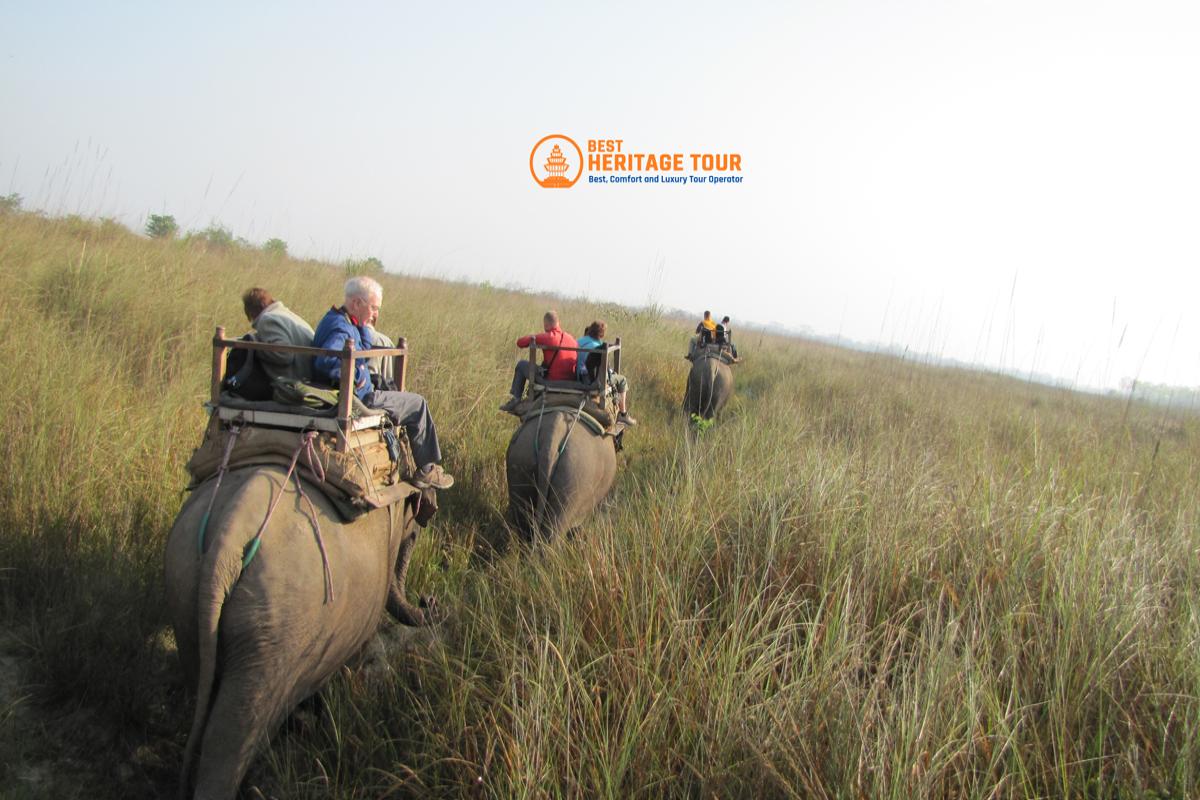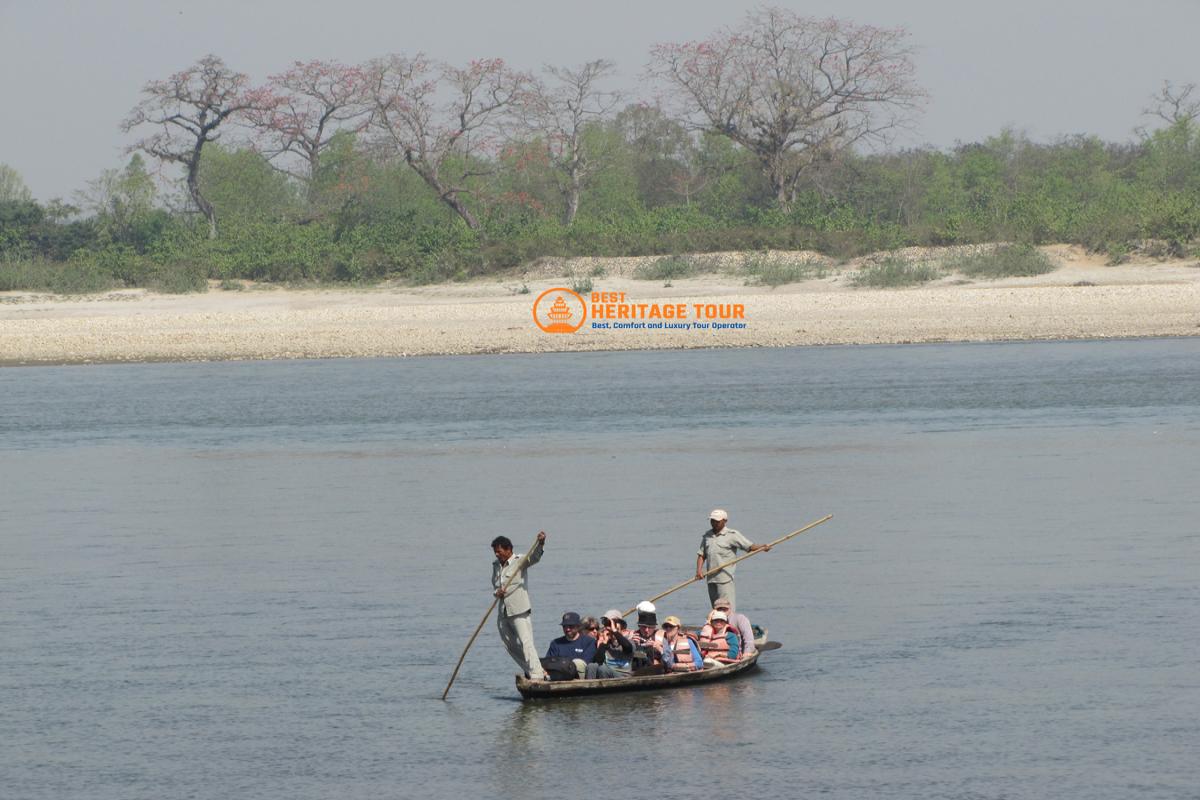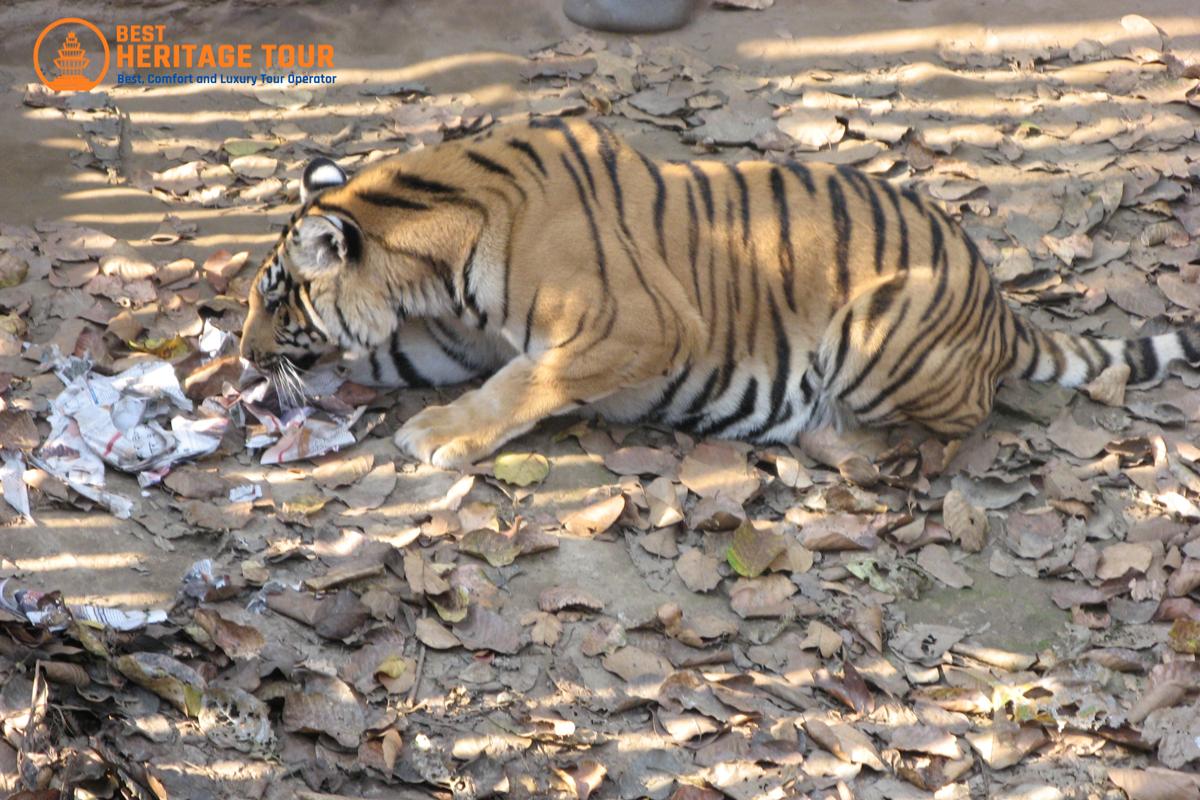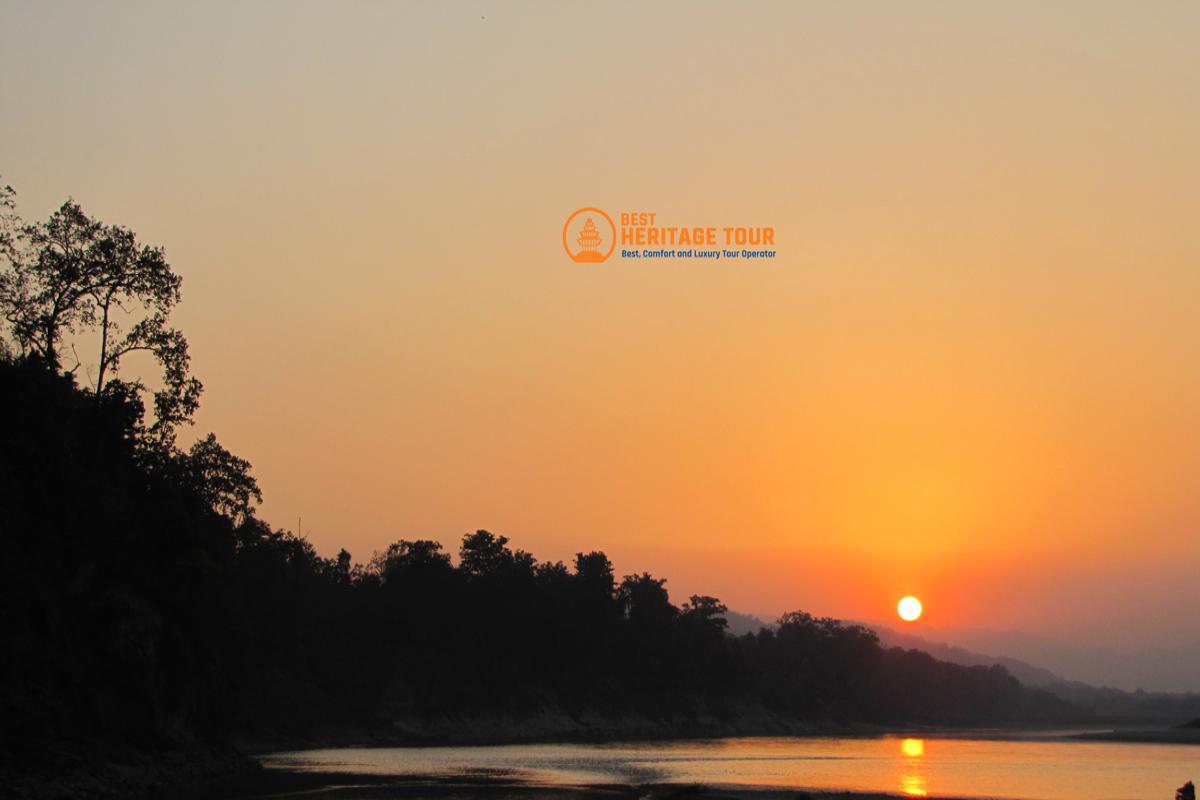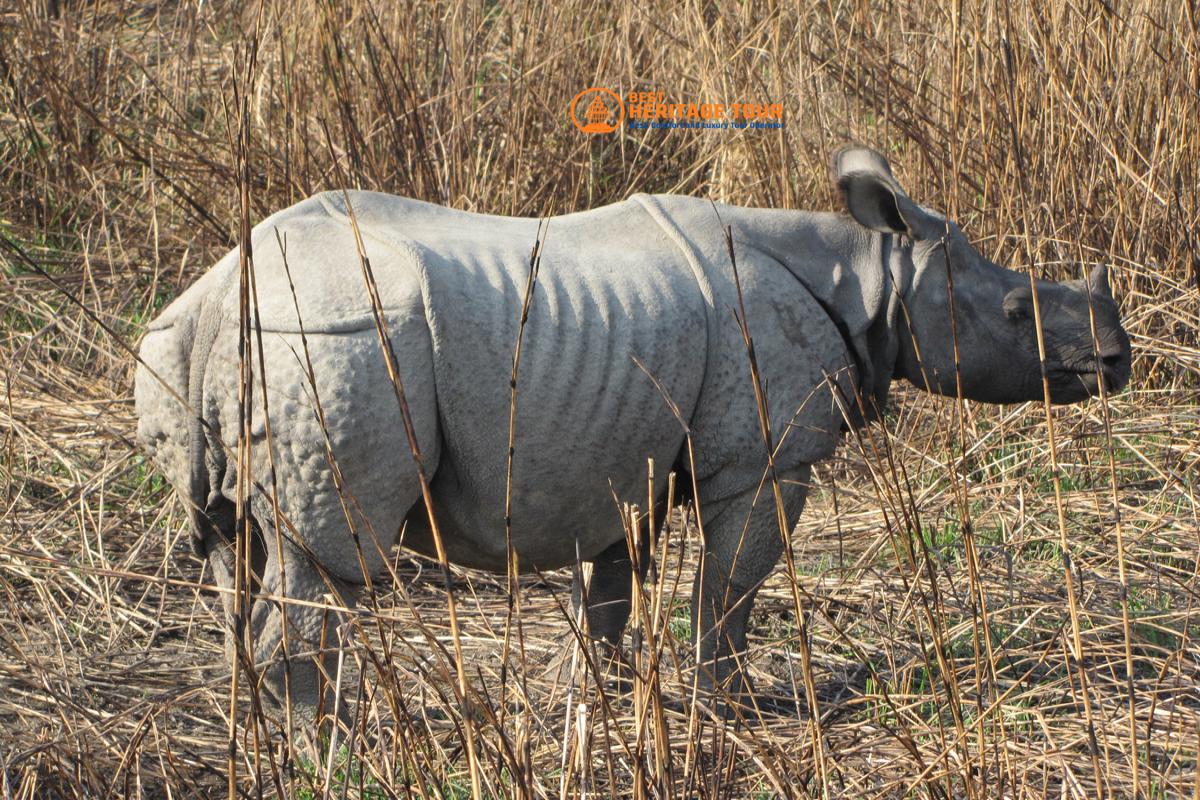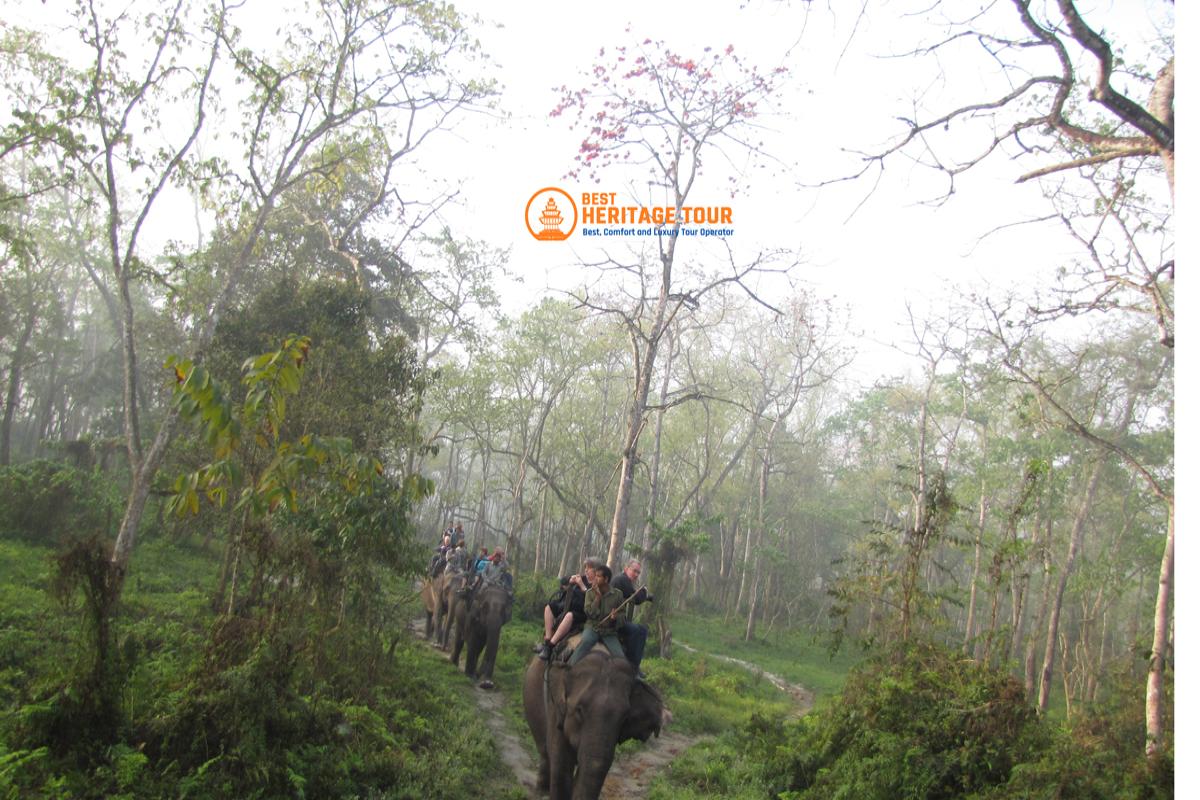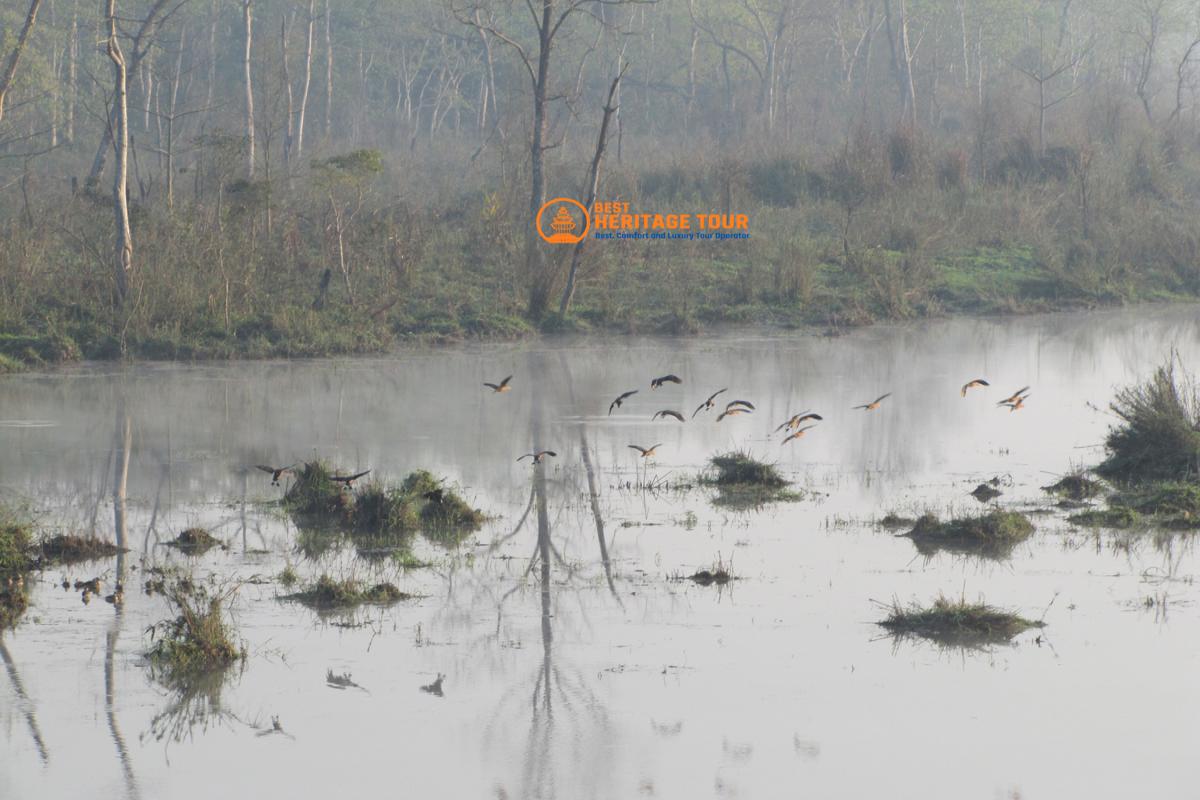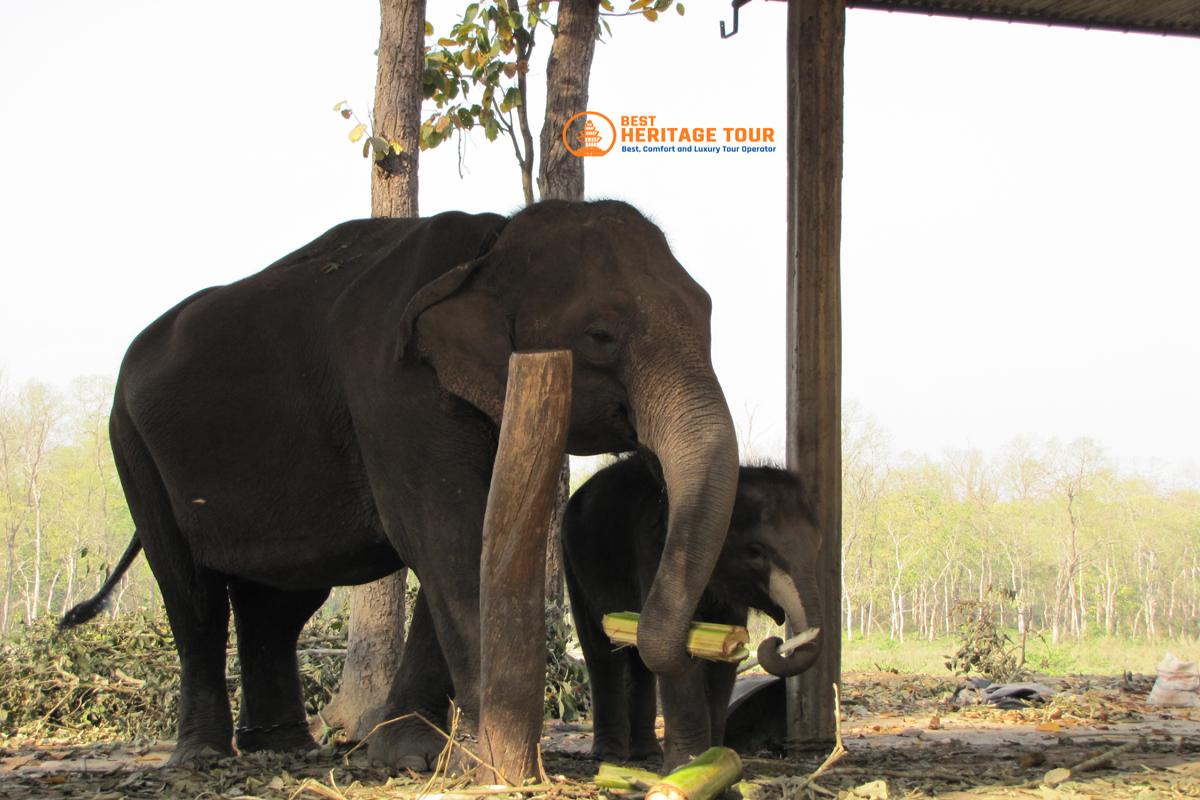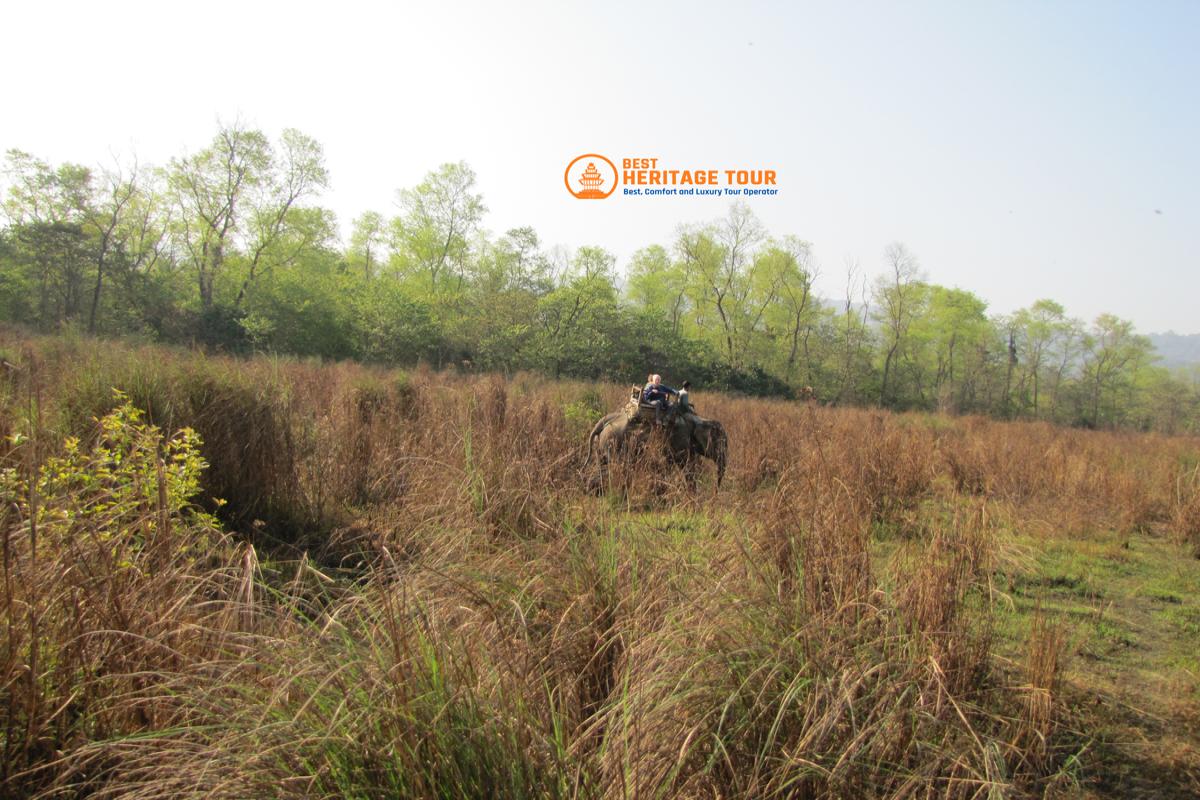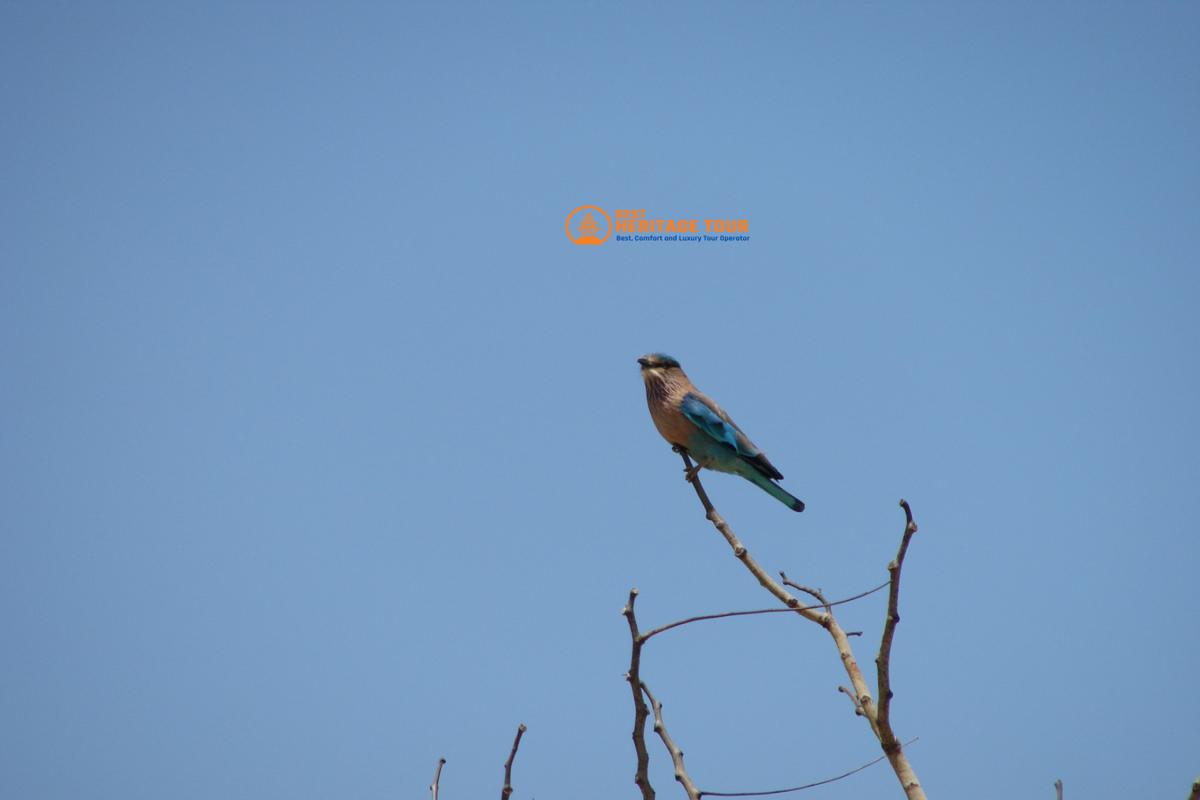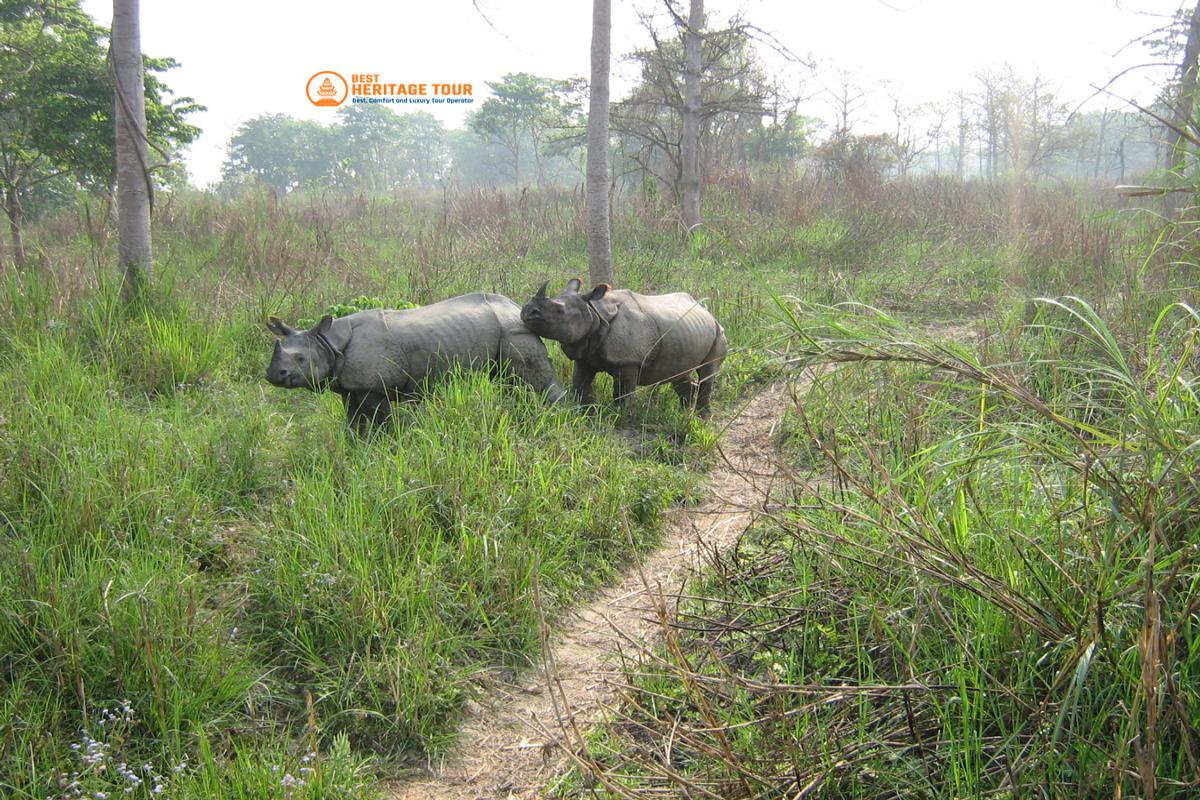Chitwan National Park Jungle Safari Tour - 4 Days
Insight on Chitwan National Park Safari
The Chitwan Jungle Safari Tour delivers an exhilarating wildlife adventure in Nepal's famed Chitwan National Park. Explore the jungle by jeep, boat, and on foot, spotting rare species like Bengal tigers, rhinos, and crocodiles. The tour offers a close encounter with nature’s raw beauty, combining thrill and tranquility in a protected haven. Perfect for wildlife enthusiasts and adventure seekers, this safari immerses you in the untamed wilderness while offering unforgettable moments in one of Asia’s best-preserved ecosystems.
Trip at a Glance
Key Highlights
- Scenic drive or flight from Kathmandu, Pokhara, or Lumbini to Chitwan
- Explore Chitwan National Park, Nepal's first and most celebrated national park
- Jungle safari by jeep or optional elephant-back ride
- Observe One-horned rhinoceroses, Bengal tigers, and wild elephants.
- Birdwatching for over 500 bird species in their natural habitat
- Canoe ride along the Rapti River, spotting crocodiles and aquatic life
- Jungle walk with local guides to discover unique flora and fauna
- Experience Tharu culture through village tours and traditional dance performances
- Visit the Elephant Breeding Center and interact with trained elephants
- Relax and enjoy the sunset from the riverside viewpoint
- Savor authentic Nepali and Tharu cuisine, including local delicacies
- Shop for unique souvenirs in the local markets of Sauraha
Benefits of Chitwan Jungle Safari with the Best Heritage Tour
- Service for pickup and drop-off at both international and domestic airports is provided.
- Best Heritage Tour T-Shirt
- Luxury Accommodation
- Flexible transportation options
- Safety measured with medical kits
- Well-Planned Itinerary
- Opportunity to join local cultural programs for a rich, immersive experience
- Convenient booking options available through 2026 at competitive rates
- English-Speaking Certified Guides
- Rewards and discounts for returning guests
- Free excess luggage storage for a hassle-free adventure
Trip Overview
Are you prepared to begin an exceptional adventure into the wilderness of Nepal?
The Chitwan Jungle Safari offers a thrilling 3-night, 4-day experience in Chitwan National Park, a UNESCO World Heritage Site celebrated for its incredible biodiversity. Spanning 932 square kilometers of lush Terai lowlands, this park is a sanctuary for remarkable wildlife, including the elusive Bengal tiger, the majestic one-horned rhinoceros, Asian elephants, and over 650 species of vibrant birds.
Your adventure kicks off with exhilarating jeep safaris, guiding you deep into the heart of the jungle, where wildlife encounters abound. Glide along the tranquil Rapti River on a canoe, where you may spot basking crocodiles and diverse birdlife. For a truly unique perspective, enjoy an unforgettable elephant ride that allows you to traverse the park’s stunning landscapes.
But the Chitwan Jungle Safari is not just about wildlife; it’s also a cultural immersion into the lives of the indigenous Tharu community. Visit traditional villages, savor authentic local dishes, and witness vibrant cultural performances that showcase their rich heritage and customs.
Perfect for families and adventure enthusiasts alike, the ideal time to visit is between October and March when wildlife sightings are at their peak and the weather is pleasantly mild. With customizable itineraries tailored to your interests, booking your Chitwan Jungle Safari is both easy and flexible.
Join Best Heritage Tour for an incredible adventure in Chitwan National Park, where nature's wonders and cultural treasures come together for an unforgettable experience!
Itinerary
The first day of your 4-day Chitwan National Park tour will bring you to the park headquarters in Sauraha. Upon your arrival at the hotel, you may dedicate the remainder of the day to discovering the city and its nearby attractions. Sauraha features a vibrant market where you can purchase local handicrafts, apparel, and mementos. You can also visit the Elephant Breeding Centre, which is home to over 70 elephants, including babies. Here, you will have the opportunity to gain insights into elephant breeding and its significance in the park's conservation initiatives. In the evening, you can take part in a cultural program with traditional Taru dance and music. The Taru people are indigenous to the region and have a unique culture and way of life. This program presents an excellent chance to immerse yourself in local traditions while enjoying an energetic music and dance performance.
Day 2 of your 4 day Chitwan National Park tour will see you exploring the park on foot and by boat. After breakfast, you will depart for a jungle hike with an experienced guide. The hike will take you through dense forests, grasslands and riverbanks. You will have the opportunity to observe a variety of wildlife, including deer, monkeys, wild boars and many types of birds. Your guide will also explain the park's ecosystem, conservation efforts and the different flora and fauna species you will encounter.
Following your jungle trek, embark on a canoe excursion along the Rapti River. The river is home to crocodiles, otters and a variety of water birds. As you float down the river, you can view wildlife from a different perspective and enjoy the tranquil surroundings.
Day 3 of your 4 day Chitwan National Park tour package will see you explore the park on the back of an elephant. After breakfast, head to the park's elephant house where you will meet the gentle giants for the day. The elephants are well trained and well looked after, and the safari is a unique opportunity to get up close and personal with wildlife.
During the safari, you will traverse grasslands and woodlands, remaining vigilant for sightings of rhinos, tigers, and various other wildlife. Your mahout (elephant guide) will introduce you to different species of birds and tell you interesting facts about them. The safari will last approximately three hours, after which you will return to the hotel for lunch.
In the afternoon, engage in bird watching with a knowledgeable local guide. Chitwan National Park is home to over 500 bird species, including endangered species such as the Bengal florican and the Oriental stork. Your guide will help you identify different birds and provide information about their habits and habitats.
On the last day of your Chitwan National Park jungle safari tour, check out of your hotel and depart Chitwan. If you have time, you can visit the park's museum and visitor center to learn about the park's history, geography, and wildlife. You can also purchase souvenirs and crafts at the park's gift shop.
What is included?
- Round-trip transportation from Kathmandu or Pokhara in an A/C tourist bus
- Pick-up and drop-off at Chitwan Bus Park
- 3 nights deluxe A/C hotel or resort
- Buffet-style meals with 3 breakfasts, 3 lunches, and 3 dinners (including tea and coffee)
- All safari activities: elephant or jeep safari, jungle walk, bird watching, canoeing, cultural show, village tour, and visit to the elephant breeding center
- Experienced, English-speaking nature guide
- Entrance fees, park permits, and conservation fees for Chitwan National Park
What is not included?
- Private transportation by car, jeep, or flight (contact us for rates)
- Accommodation and dining options in Kathmandu or Pokhara are available.
- International flight costs and the fee for a Nepal entry visa (which can be conveniently obtained upon arrival) are applicable.
- Travel insurance that includes coverage for accidents, emergencies, loss, theft, or damage to luggage and personal belongings.
- Emergency evacuation if required
- Personal expenses, including alcoholic beverages, mineral water, soft drinks, juice, phone calls, laundry, and internet
- Tips for guides, gifts, and souvenirs
- Optional overnight stay in a tower house inside the National Park for an additional USD 50 per person
- All government taxes 13%, SSF, and 10% service charges
Route Map
Equipment
When planning a jungle safari in Chitwan National Park, it is crucial to gather the necessary items to ensure a comfortable, safe, and enjoyable adventure. Here’s what to bring:
Light, Breathable Clothing: Chitwan's subtropical climate can be warm and humid, so pack light, quick-dry clothing that’s easy to wash and comfortable in hot weather. A light jacket for early mornings may also be helpful.
Footwear: While flip-flops or sandals are comfortable for lounging around the lodge, bring sturdy shoes for jungle walks and safari activities.
Sun Protection: It is vital to have sunscreen, a wide-brimmed hat, and sunglasses to shield yourself from the intense sunlight prevalent in the Terai lowlands.
Insect Repellent: Chitwan is known for its diverse insect life, so bring a quality insect repellent to keep mosquitoes and other bugs at bay.
Medications and First Aid: Pack any essential prescription medications as well as general over-the-counter medicine for headaches, allergies, and minor injuries. A small first aid kit with bandages, disinfectant, and other basics is also recommended.
Camera and Binoculars: With Chitwan’s rich wildlife, binoculars, and a camera are must-haves to capture the park’s incredible flora and fauna up close.
Reusable Water Bottle: Staying hydrated is crucial in the warm climate, so bring a reusable water bottle to refill throughout your tour.
Cash and Cards: Carry cash and a debit or credit card for expenses like souvenirs, additional activities, and tips for guides and staff.
Travel Documents: Keep your passport, travel insurance details, and any other important travel documents handy for a smooth journey and entry.
Trip Info
Preparing for Your Chitwan National Park Tour
- Best time to visit: Plan your trip in spring or autumn to avoid the high temperatures of the Terai summer.
- Follow your guide: When exploring the jungle, always follow your guide's instructions to protect yourself from wild animals.
- Always carry important documents: Make sure you have all the necessary documents as you may need them during the tour.
- Research the area: Familiarize yourself with the park and the Tharu culture before your visit to enrich your experience.
- Choose the right tour operator, Book with Best Heritage Tours to get the best service and unforgettable adventure.
Chitwan Jungle Safari Tour Cost 2024-2025
Explore the rich biodiversity and thrilling wildlife of Chitwan National Park, a premier destination in Nepal for nature enthusiasts. Known for its diverse ecosystems, Chitwan is home to iconic species such as Bengal tigers, one-horned rhinos, and exotic bird species. For a convenient and immersive experience, we offer comprehensive packages that include round-trip transportation from Kathmandu, all meals, experienced nature guides, resort accommodations, and park entrance fees. Chitwan National Park Tour prices range from $450 to $650 per person, depending on the itinerary, including services, and group size. Detailed pricing is outlined below:
- Solo traveler: $650
- Groups of 2-6 individuals: $600 per person
- Groups of 7-10 individuals: $550 per person
- Groups of 11-20 individuals: $450 per person
These packages provide a complete and seamless experience for travelers of all group sizes, allowing you to focus on the adventure and natural beauty of Chitwan National Park.
Useful Information
Best Season for Jungle Safari in Chitwan
The best season for a jungle safari in Chitwan National Park is from October to March. During these months, the weather is mild and dry, providing comfortable temperatures and excellent visibility, making it easier to spot wildlife. Here is a seasonal overview:
1. October to March (Autumn to Early Spring):
This period is considered the prime time for safaris, with temperatures ranging from 10°C to 25°C (50°F to 77°F). The dry season means less foliage, so animals are easier to spot, and the mild weather allows for longer excursions without extreme heat or rain.
2. April to June (Pre-Monsoon):
While the park remains accessible, temperatures begin to rise considerably, occasionally reaching as high as 40°C (104°F) in May and June. This season also provides excellent opportunities for wildlife observation, as animals congregate around water sources in response to the arid conditions.
3. July to September (Monsoon Season):
Monsoon rains bring lush vegetation and high humidity, and certain parts of the park may become inaccessible due to flooding. Animal sightings are less frequent as animals seek shelter, so this is generally considered the off-season for safaris.
For a rewarding and comfortable jungle safari in Chitwan, October through March is highly recommended, offering the best balance of weather and wildlife visibility.
Chitwan National Park Entry Permit
- Fees: The entrance fees are USD 20 for foreign visitors, USD 15 for SAARC nationals, and NPR 150 for Nepali citizens (charged per person, per day).
- Where to Acquire: Insurance can be obtained at the primary park entrances in Sauraha and Meghauli or through licensed tour operators.
- Validity: The permit is valid for one day; renew for multiple-day visits.
- Regulations: Non-transferable; visitors must carry their permits while in the park.
Note: Entry fees aid in conservation. The park operates from sunrise to sunset, with visitors encouraged to stay in designated areas after dark for safety.
Types of Safaris in Chitwan
Chitwan National Park offers a variety of safari experiences, each providing unique opportunities to explore its rich biodiversity. Here are the main types of safaris you can enjoy:
1. Jeep Safari:
This thrilling journey allows for the exploration of the park's varied landscapes. Guided by experienced naturalists, you’ll have the chance to spot wildlife like tigers, rhinoceroses, deer, and various bird species.
2. Elephant Safari:
Experience the park from an elevated perspective on the back of an elephant. This traditional safari allows for close encounters with wildlife and is especially popular for observing animals in dense jungle areas.
3. Canoeing Safari:
Paddle down the serene Rapti River while enjoying the sights of aquatic wildlife, including crocodiles and various bird species. This serene experience provides a unique perspective on the park's diverse ecosystems.
4. Jungle Walk:
A guided walking safari offers a close and personal encounter with the natural environment. Learn about the flora and fauna, track animal footprints, and spot wildlife up close while exploring the park on foot.
5. Bird Watching:
Chitwan serves as a haven for avian enthusiasts, featuring more than 500 bird species. Guided birdwatching tours help you identify and observe various birds in their natural habitat, including rare and endangered species.
6. Cultural Tours:
Engage with the local Tharu community through village tours and cultural performances. Learn about their traditions, lifestyle, and relationship with the surrounding nature.
Animals and Birds of Chitwan National Park
Chitwan National Park is a UNESCO World Heritage Site and one of the premier wildlife reserves in Nepal, located in the Terai region. The park boasts a rich diversity of flora and fauna, making it a haven for nature enthusiasts and wildlife lovers. Chitwan is renowned for its population of Bengal tigers, one-horned rhinoceroses, and a plethora of bird species. Here is a list of animals and birds that can be found in Chitwan National Park. Here’s an overview of some of the key animals and birds you can encounter in the park:
1. Mammals
- One-Horned Rhinoceros
- Bengal Tiger
- Asian Elephant
- Leopard
- Wild Boar
- Deer Species
- Sloth Bear
- Gharial and Mugger Crocodile
2. Birds
Chitwan National Park serves as an ideal destination for birdwatching enthusiasts, boasting more than 500 distinct bird species. Here are some notable ones:
- Brahminy Duck
- Great Hornbill
- Indian Peafowl (Peacock)
- Kingfisher Species
- Woodpeckers
- Egrets and Herons
- Lesser Adjutant Stork
- Asian Openbill Stork
3. Reptiles and Amphibians
- Python
- Various Tortoises and Lizards
Food and Accommodation during Chitwan Jungle Safari
With our Chitwan Jungle Safari tour, all your food and accommodation needs will be expertly managed, ensuring a hassle-free and enjoyable experience. Our partners prioritize hygiene and provide nutritious meals throughout your stay. From authentic Nepali dishes to a selection of international cuisine, you’ll find a variety of options to satisfy your palate at our accommodations.
Be sure to sample traditional Tharu cuisine, which adds a unique flavor to your culinary experience and reflects the rich cultural heritage of the region. Three hearty meals each day will keep you energized and ready for your jungle adventures.
Your accommodation will be in comfortable hotels or resorts that offer amenities such as hot and cold running water, Wi-Fi, cozy beds, modern bathrooms, and attentive room service, ensuring a pleasant and restful stay during your time at Chitwan National Park.
Difficulty of Chitwan Jungle Safari Tour
The Chitwan Jungle Safari Tour is easy and fun for everyone, no matter their fitness level, which makes it a great option for families and beginners. Most activities, like jeep safaris, canoe rides, and jungle walks, involve little walking and no hard hiking. The land is mostly flat, although there might be some uneven paths. The weather can be hot and humid, but guided tours keep everyone safe when seeing wildlife. This tour is suitable for children and older adults, giving families a chance to enjoy Chitwan's amazing wildlife together without too much effort, creating lasting memories.
Chitwan Jungle Safari Insurance
When planning a Chitwan Jungle Safari, having proper insurance is essential for a safe and worry-free experience. Here’s what you need to know about insurance for your safari:
- Travel Insurance: It's highly recommended to purchase comprehensive travel insurance that covers medical emergencies, trip cancellations, and personal belongings. It is essential to ensure that your insurance policy encompasses activities such as jungle safaris and wildlife interactions.
- Medical Coverage: Confirm that your insurance plan provides for medical expenses in the event of injury or illness sustained during the safari. This coverage is crucial, especially in remote areas where immediate medical assistance may not be available.
- Emergency Evacuation: Seek insurance that includes provisions for emergency evacuation services. In the event of a serious injury or health issue, this coverage ensures you can be transported to the nearest medical facility.
- Adventure Activities: Confirm that your policy covers adventure activities you may engage in, such as canoeing, jeep safaris, or guided jungle walks.
- Documentation: Keep a copy of your insurance policy and emergency contact numbers handy during your trip. This ensures you have quick access to your coverage details if needed.
Having the right insurance gives you peace of mind, allowing you to focus on enjoying the incredible wildlife and natural beauty that Chitwan National Park has to offer.
Group and Private Packages for Jungle Safari in Chitwan
We provide both private and group safari tours in Chitwan, which are highly sought after in Nepal. For private tours, the cost is $700 per person. However, if you're part of a group, the price drops to $600 per person, with generous discounts available based on the number of participants.
Best Heritage Tour can accommodate groups of all sizes. Our experienced guides and group leaders possess excellent knowledge of the region and its wildlife. Additionally, we offer photography services, with a dedicated photographer accompanying you to capture unforgettable moments during your safari adventure.
Additional Activities to Do
1. Bird Watching
Chitwan National Park is a paradise for bird enthusiasts, boasting over 500 species of birds. Whether you're an experienced birder or a casual observer, you'll have the chance to spot stunning species such as the endangered Bengal florican, great hornbill, and many migratory birds. Guided bird-watching tours can enhance your experience, as knowledgeable guides help you identify different species and their habitats.
2. Cultural Experiences
Visiting nearby Tharu villages offers a unique opportunity to immerse yourself in the indigenous culture of the region. You can interact with the local Tharu people, learn about their traditional way of life, and experience their unique customs and practices. Engage in cultural events that showcase traditional music and dance performances, offering a glimpse into the vibrant heritage of the Tharu community.
3. Elephant Breeding Center
A visit to the Elephant Breeding Center allows you to learn about the care and training of elephants in a conservation setting. Here, you can see baby elephants and interact with their caretakers, gaining insights into the challenges of elephant conservation and the importance of protecting these magnificent creatures.
4. Canoeing
Experience the tranquility of canoeing along the Rapti or Narayani River. This activity allows you to glide through the serene waters while observing crocodiles sunbathing on the riverbanks and spotting various bird species. The peaceful setting is perfect for relaxation and offers a different perspective of the park's stunning landscape.
5. Nature Walks
Led nature excursions offer a close examination of the varied ecosystems found in Chitwan. Accompanied by a knowledgeable guide, you can wander through the jungle, observing various flora and fauna up close. These walks often include discussions about the park's biodiversity, medicinal plants, and the ecological balance of the area.
6. Cycling Tours
For those looking to explore at their own pace, renting a bicycle is an excellent option. Cycling through the beautiful landscapes surrounding Chitwan allows you to discover hidden spots and enjoy the fresh air while taking in the scenery. This activity also offers a chance to interact with locals along the way.
7. Fishing
Fishing is allowed in designated areas of Chitwan, providing a relaxing outdoor experience. You can enjoy the tranquility of the rivers while trying to catch local fish species. This activity can be a fun and rewarding way to spend your time amidst nature.
8. Cultural Shows
In the evenings, many lodges and hotels offer cultural shows featuring traditional Tharu dances and performances. These vibrant displays showcase the rich cultural heritage of the Tharu people and allow you to appreciate their art forms and storytelling traditions.
9. Sunset Views
Chitwan's sunsets are breathtaking, and finding a vantage point along the river or in the jungle can provide stunning views as the sun dips below the horizon. Whether you're on a guided safari or enjoying a quiet moment at your accommodation, witnessing the sunset can be a magical experience.
Procedure for Booking a 3 Nights 4 Days Tour of Chitwan National Park
At Best Heritage Tour, we pride ourselves on providing exceptional travel experiences in Nepal for over a decade. Our company is recognized by both the Nepal Mountaineering Association (NMA) and the Nepal Trekking Agency Association (TAAN), ensuring you receive reliable and professional service.
To book your 3 Nights 4 Days Chitwan National Park tour package, you can follow these simple steps:
- Deposit Payment: To confirm your reservation, a deposit amounting to 10% of the total cost of the tour is necessary. This deposit confirms your reservation and allows us to prepare for your arrival.
- Document Submission: After making the deposit, please email us copies of your essential documents within one week of booking. The required documents consist of your passport, passport photographs, and travel insurance (although travel insurance is not compulsory). Additionally, we request your arrival and departure flight information for seamless planning.
- Payment Options: You can pay your deposit through various methods, including bank transfer, Western Union, or directly on our website.
- Final Payment: Upon your arrival in Nepal, you will have three convenient options for the remaining balance: cash, bank transfer, or credit card. We will provide you with detailed payment information, including the total amount due and the preferred payment method, via email. This practice promotes transparency and enables you to make appropriate arrangements.
Our straightforward booking process, combined with our dedication to customer satisfaction, allows you to confidently reserve your tour of Chitwan National Park, assured that your experience in one of Nepal's most breathtaking national parks is in capable hands.
Review
Amazing Chitwan Jungle Safari Experience!
I recently went to Chitwan National Park for a jungle safari with Best Heritage Tour and it was an amazing safari. The tour was well-organized from beginning to end and our guide...
View DetailPerfectly arranged safari with best guide
I got to see the one horned rhino roaming freely in the nature in Chitwan national park. I had previously seen them but in zoo. Watching them in their natural habitat was an...
View DetailGreat jungle safari
We couple just completed the Annpurna circuit trek and got some time left in Nepal before returning. We asked Best heritage tour, our trek organizer to organize another small tour...
View DetailUnforgettable Chitwan National Park Safari
I recently went on the 4 days chitwan national park tour with my family and it was an amazing experience. Best heritage tour took care of the whole tour from beginning to end. They...
View DetailFAQ's
Yes, most visitors need a tourist visa to enter Nepal. A visa can be obtained on arrival at Tribhuvan International Airport in Kathmandu or applied for in advance at a Nepalese embassy or consulate.
Yes, you will need two passport-sized photos for both the visa application and the trekking permits, so it's a good idea to bring extra copies just in case.
You'll need a valid passport (with at least six months validity), a passport-sized photo, and the visa fee (which varies depending on the duration of stay).
To obtain the RAP, you’ll need:
- A valid passport.
- A Nepal visa.
- Travel insurance.
- Two passport-sized photos.
- A letter from your trekking agency detailing your itinerary and the names of the guide and group.
Yes, it’s possible to extend your visa if you wish to stay longer in Nepal. Extensions can be processed at the Department of Immigration in Kathmandu or Pokhara, but you should apply before your current visa expires.
You can exchange US dollars or Euros for Nepalese rupees upon arrival, but we recommend carrying cash in the local currency for most transactions outside of major cities.
Yes, Nepal offers an electronic visa (e-visa) that can be applied for online before arriving. This process enables you to bypass the visa queue upon arrival at the airport. After completing the online application, you can get your visa stamped on arrival.
Yes, if you wish to extend your stay, you can apply for a visa extension at the immigration office in Kathmandu or Pokhara.
The package typically includes jungle safaris, bird watching, nature walks, Tharu cultural shows, and a guided tour of nearby heritage sites.
The "Best Heritage Tour" includes guided safari experiences, cultural interactions, and accommodation in eco-friendly lodges. It highlights both the natural beauty and cultural heritage of the region, providing an immersive experience.
Engaging a guide significantly enriches your safari experience by offering essential knowledge about the park's ecosystem, animal behaviors, and the local culture. Guides are trained professionals familiar with the terrain and can ensure your safety while maximizing wildlife viewing opportunities.
While Nepali is the primary language, most staff members in lodges speak English, and some may even speak other languages. Communication should not be an issue for international tourists.
The package typically includes accommodation, meals, guided safaris, park entrance fees, and some cultural experiences.
Extra costs may include:
- Alcoholic beverages
- Tips for guides and staff
- Optional activities (e.g., elephant rides, cultural programs)
- Travel insurance
Typically, meals are included in the accommodation package, especially for full-board options. This usually covers breakfast, lunch, and dinner, with options for vegetarian and non-vegetarian dishes.
Yes, most lodges are accommodating and can cater to specific dietary requirements, including vegetarian, vegan, or gluten-free options. It's best to inform them in advance of your needs.
Yes, most lodges offer various activities that can be booked upon arrival. Popular options include jungle safaris, guided birdwatching, cultural visits to local villages, and nature walks.
- Clothing: Light, breathable clothing suitable for warm weather; a light jacket for cooler evenings; and comfortable trekking shoes.
- Accessories: Binoculars for bird watching, a camera, sunscreen, insect repellent, and a reusable water bottle.
- Personal items: Any necessary medications, personal hygiene items, and snacks.
Comfortable hiking boots, a rain jacket, and a daypack are recommended. If you have binoculars or a guidebook, bring them along for enhanced wildlife observation.
Refrain from using plastic bags and avoid bringing food that could lure wildlife.
While your safari guide will provide information and navigation, bringing a field guide for flora and fauna can enhance your experience. It’s also helpful to have a map for personal reference.
Basic fitness is recommended. While the safaris are not overly strenuous, participants should be able to walk for a few hours on uneven terrain.
Some lodges may offer alternative activities, but it's best to check with your tour operator regarding specific arrangements.
Seek advice from your healthcare provider regarding necessary vaccinations, which may include Hepatitis A, Typhoid, and Tetanus. Malaria prophylaxis may also be suggested depending on your travel itinerary.
Yes, travel insurance is highly recommended. It should cover medical emergencies, trip cancellations, and theft. Check if it includes activities like trekking and wildlife safaris.
Your lodge should have first aid facilities, and guides are typically trained in basic first aid. Ensure you have access to emergency contact information and know the location of the nearest medical facilities.
Use insect repellent containing DEET on exposed skin and wear long-sleeved shirts and long pants in the evening. Mosquito nets may also be provided at your accommodation.
The primary languages are Nepali and English. Most guides speak English, making communication easier for international tourists.
Mobile coverage is limited within the park. Some accommodations may offer Wi-Fi, but it's best to check in advance.
Respect local customs and traditions. Always ask for permission before taking photographs of people, and dress modestly when visiting villages.
It’s advisable to be up-to-date on routine vaccinations, including hepatitis A and typhoid. Talk to your doctor about the vaccinations you need for Nepal.
Choosing the best heritage tour provides an enriching cultural experience, blending education, comfort, and unique local interactions for unforgettable travel memories.
The majority of international flights arrive at Tribhuvan International Airport, which is located in Kathmandu. From this location, travelers can connect to Lukla to commence their trekking journey.
You typically need a valid passport, a completed visa application form, and a passport-sized photo. Payment can be made in cash or via card at the airport.
Yes, tourist visas are eligible for extension at the Department of Immigration located in Kathmandu. Ensure you have a valid reason and required documents for the extension.
The Chitwan Jungle Safari is a 3-night, 4-day experience in Chitwan National Park, known for its wildlife, including Bengal tigers, rhinos, elephants, and a variety of bird species. The safari includes guided jungle walks, canoe rides, and cultural programs.
Activities typically include jeep safaris, canoeing, bird watching, jungle walks, Tharu cultural shows, and elephant breeding center visits.
Chitwan National Park is Nepal’s first national park, designated a UNESCO World Heritage Site in 1984, famous for its diverse ecosystem, including rare species like the one-horned rhinoceros, Bengal tiger, and gharial crocodile.
Activities typically last 2–4 hours each, allowing plenty of time for relaxation at your accommodation.
The safari provides an intimate encounter with the abundant wildlife and varied cultural heritage of Nepal. Highlights include sightings of endangered species like the one-horned rhino and Bengal tiger, scenic canoe rides, bird-watching tours, and engaging with the Tharu community’s culture and traditional dances.
Established in 1973 and declared a UNESCO World Heritage Site in 1984, Chitwan National Park is Nepal’s oldest and most famous national park, covering 932 square kilometers of grassland, forest, and river ecosystems.
Days start early with a wake-up call for morning activities such as jungle walks or bird watching. After breakfast, you’ll embark on other excursions like a jeep safari or village tour. Afternoons often involve rest time or additional activities, with evenings reserved for dinner and sometimes cultural shows.
The park is home to over 68 mammal species and 540 bird species, including the Bengal tiger, Asian elephant, one-horned rhinoceros, sloth bear, leopard, gharial crocodile, and various species of deer and monkeys.
Visitors can participate in a Tharu village tour, which showcases the indigenous Tharu community’s way of life, and enjoy a traditional Tharu dance performance featuring their unique attire, music, and folk dances.
Safari group sizes vary, but private or small group tours (up to 10 people) are common for a more personalized experience. Larger groups may also be available, depending on the package and operator.
Yes, licensed naturalist guides accompany all tours and activities. These guides are well-versed in the local ecosystem, wildlife behavior, and safety protocols, enhancing your understanding of Chitwan’s unique environment.
The best time is from October to March when the weather is pleasant, with cooler mornings and evenings. The monsoon season (June-August) is less ideal due to heavy rains.
Chitwan has a subtropical climate. Winter (November-February) is mild, while summers (April-June) can get hot and humid, with temperatures reaching up to 40°C (104°F).
- Winter (November-February): Dry and pleasant, with temperatures ranging from 7°C (45°F) to 23°C (73°F). Ideal for safaris due to fewer insects.
- Summer (April-June): Hot and humid, 30-40°C (86-104°F). Best for lush landscapes but might be uncomfortable for some due to the heat.
- Monsoon (June-August): Heavy rainfall, 24-33°C (75-91°F). Activities may be limited by rain, and the terrain can get muddy.
Yes, but the winter season is the best time to spot wildlife, as animals are more active during cooler months.
You can reach Chitwan by air (via Bharatpur Airport) or by road (a 5–6-hour drive from Kathmandu).
Yes, international visitors need a visa, which can be obtained on arrival at Kathmandu’s Tribhuvan International Airport.
Most packages cover accommodation, meals, transportation, and guided activities within the park.
You may have additional costs for tips, souvenirs, or any extra personal expenses outside of the package.
Larger hotels and resorts accept credit cards, but it’s best to carry cash for small purchases or at local eateries.
Tips are not obligatory but appreciated. A general guideline is around $5-10 per day for guides and $2-5 per day for other staff.
Yes, the safari is suitable for children, adults, and elderly visitors, as activities can be customized based on preference.
The safari is generally accessible, but for those with health conditions, it’s advisable to consult a physician. Special arrangements can be made for elderly or physically challenged guests.
Yes, there are many family-friendly activities like canoeing and cultural shows. Some lodges provide babysitting options.
Options vary from economical lodges to moderately priced resorts and high-end eco-lodges. Budget lodges provide essential amenities, while higher-end resorts often offer facilities like swimming pools, spa services, air conditioning, and scenic views.
Jungle lodges, typically within or near the park’s buffer zones, provide a more immersive nature experience, often with a rustic charm and proximity to the wildlife. Town hotels, often located in Sauraha or Bharatpur, offer more urban conveniences and easier access to local shops and restaurants.
Most lodges offer full-board meal plans, with breakfast, lunch, and dinner included. Meals are typically served buffet-style with a mix of Nepali, Indian, and international dishes. Special dietary needs can frequently be met with prior notification.
Standard amenities often include en-suite bathrooms, hot water, basic toiletries, mosquito nets, and comfortable bedding. Mid-range and luxury resorts may offer additional comforts like air conditioning, room service, private balconies, and Wi-Fi.
Many lodges and resorts are eco-conscious, implementing practices like solar power, rainwater harvesting, and waste management to minimize their environmental impact. Look for eco-lodges if sustainability is important to you.
Wi-Fi availability varies. Budget accommodations may have limited or no Wi-Fi, while mid-range and luxury lodges usually offer it in common areas or sometimes in rooms, though speeds can be slower in remote areas.
Lodges closer to the park's boundaries or buffer zones often offer the best access to safari activities and occasional wildlife sightings from the property itself.
Most lodges supply safe drinking water or have water filtration systems. It’s generally recommended to bring a reusable water bottle, as bottled water may not always be available or eco-friendly.
Many lodges have options for private rooms, family rooms, and sometimes interconnecting rooms for larger groups or families traveling together. Make sure to specify this request when booking.
Yes, most accommodations in the park area provide mosquito nets or screens to ensure a comfortable stay, especially during warmer months when insects are more prevalent.
Essentials include light clothing for daytime, warm clothing for cool mornings/evenings, comfortable shoes, insect repellent, sunscreen, and a hat.
- Daytime: Lightweight, breathable clothing in neutral colors to avoid startling animals.
- Evenings: Warmer clothing, as temperatures can drop.
- Extras: Rain jacket, sturdy shoes, insect repellent, and sunscreen are essential.
For cultural visits, such as the Tharu village tour, dressing modestly (covering shoulders and knees) is appreciated as a sign of respect.
No special fitness level is required, as activities are not physically demanding.
Most activities, like jeep safaris and canoeing, are not physically strenuous. Jungle walks may require moderate fitness, but they’re designed to be accessible for most people.
Inform your tour operator in advance about any medical conditions. Guides can adjust the itinerary to accommodate your needs
Yes, safety is prioritized, with experienced guides for all activities. Guests are advised to follow instructions for a safe experience.
It’s recommended to check with your healthcare provider about vaccinations for travel in Nepal.
There are basic medical facilities in Sauraha and Bharatpur, with more advanced hospitals in Kathmandu and Pokhara.
The safaris are safe if guidelines are followed, as guides are trained to handle potential wildlife encounters. Stay close to the group and follow instructions.
Vaccinations for typhoid, hepatitis A, and tetanus are recommended. Discuss malaria prophylaxis with your doctor, as Chitwan is a low-risk zone.
Some areas have mobile network coverage, though it may be spotty in remote areas.
Yes, ATMs are available in towns around Chitwan, but it’s advisable to carry some cash.
Mobile coverage is generally available in the park’s buffer zones, but internet access may be limited or slow. Some lodges offer Wi-Fi.
No, it’s best to drink bottled or purified water. Lodges provide safe drinking water.
Power outages may occur, so it’s helpful to bring a power bank or solar charger for electronics.
Most packages exclude flights. You can book flights from Kathmandu to Bharatpur if you prefer not to travel by road.
Local transport includes jeeps, canoes, and sometimes ox carts or bicycles for short distances.
Flying is faster, with a flight time of around 25 minutes from Kathmandu to Bharatpur. Driving allows for scenic views and can be a more budget-friendly option.
Yes, packages usually include all local transfers, including airport pick-ups and drop-offs, as well as transport for all safari activities.
If you wish to extend your stay in Nepal beyond your visa’s initial duration, you can do so by applying at the Department of Immigration in Kathmandu. Extensions are available for a maximum of 30 days, and it’s recommended to apply before your current visa expires. Best Heritage Tour can help you with the extension process if required during your Australian Camp Trek.

